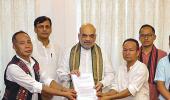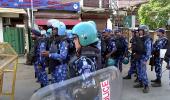'This committee underscores the Indian State's longstanding conventional approach to leverage top-down conflict management in North East India in general and Manipur in particular.'
'Trying to 'manage' violent conflicts top-down has not worked in the past, and apparently does not seem to work this time either.'

In the first part of an e-mail interview to Syed Firdaus Ashraf/Rediff.com, Kham Khan Suan Hausing, professor and head, department of political science, University of Hyderabad, spoke about why the people of Manipur are upset with the central government.
"Disarming armed militant groups is a welcome step to stop the violence in the state," says Hausing, also a senior fellow, Centre for Multilevel Federalism, Institute of Social Sciences, New Delhi, in the concluding part of his interview.
- Part 1 of the Interview: 'Modi's silence has grievously hurt the people of Manipur'
Why do the Kukis believe that the state police, including the Manipur Rifles, favour Meiteis? Is there any truth in these allegations?
There are credible reports that the state police constabularies including the Manipur Rifles openly extend security cover to armed Meitei militant groups like Arambam Tenggol and Meitei Leepun to undertake offensive attacks and arsons on Kuki-Zomi villages on the foothills.
The most recent offensive strikes against Kuki villages like Khamenlok, Aigejang and Khopibung, where armed Meitei groups were mobilised in thousands to launch attacks against these villages under full security cover provided by the state police.
Reports on wanton abuse of State-owned ambulances to provide ammunition and reinforcements to the Meitei armed groups in the name of evacuating injured combatants are beyond belief.
And the allegation of the Meiteis is that Assam Rifles, the longest serving paramilitary force in the state, is turning a blind eye to illegal poppy cultivation in Kuki-dominated hills.
Is this allegation true? Does it mean that the central armed forces are supporting the Kukis and state armed forces are supporting the Meiteis resulting in permanent tensions on the ground?
I think the allegation of the Meiteis that Assam Rifles have turned a blind eye to illegal poppy cultivation in Kuki-dominated hills is misplaced as the responsibility of preventing such illegal practices lies squarely with the state government.
Given that all communities in the state have been involved in poppy cultivation at one point of time and given that the dominant players in the drug and gun trade in the state and across the Indo-Myanmar borders are from the valley areas, including high-ranking political leaders and proscribed Meitei terrorist organisations, selective targeting of the Kuki-Zomi conceals a much deeper problem and nexus which drive and sustain drug and gun trade in this part of the world.
The high-profile drug case busted by Thounaojam Brinda, the decorated Manipur police officer, in 2018 and Raghumani Singh, the Uripok MLA's recent letter to the Union home minister which underscore the involvement of political leaders in Biren Singh's BJP government in a May 2019 high-profile drug case demonstrate this deep nexus.
What about the disarming of different militant groups? Is there any policy from the government to ensure that different warring faction should come and surrender their arms, which is causing the largescale violence?
Disarming armed militant groups is a welcome step to stop the violence in the state.
Given that there are credible reports of handing over 4,000 automatic rifles and five lakh (500,000) rounds of live ammunition to the already armed Arambam Tenggol and Meitei Leepun -- who are frontal groups conveniently used by both the state government and six proscribed armed terrorist groups in the valley area -- it is imperative that combing operations start with right earnest from the valley areas to disarm these armed militant groups.
Similar attempts should also be made in the hill areas to disarm armed groups, which I believe should be much easier as all the militant groups in the hill areas are party to the Suspension of Operations (SoO) agreement.
Is it true that 45,000 people are living in relief camps? What are their living conditions and where are they located? What help is the Government of India providing them?
Yes, it is true that over 45,000 Internally Displaced Populations (IDP) live in relief camps of which the Kuki-Zomi groups alone counted for more than 41,000.
These IDPs are given temporary shelters across various towns of the state, among others, Lamka (Churachandpur), Kangpokpi, and Imphal, and outside the state including Aizawl (Mizoram), Guwahati, Shillong, and Delhi.
Mizoram alone has more than 10,000 Kuki-Zomi IDPs who are given shelter in various relief camps.
The conditions of relief shelters is in a bad shape as the state is yet to extend the much needed relief and rehabilitation material including food, clothing, drinking water, electricity, and healthcare.
Absent these, relief camps especially in the hill areas are compelled to rely principally on funds from neighbouring states and from philanthropic organisations within and outside the state.
Unlike Manipur, the state government of Mizoram has done a commendable job by setting up a state-level committee to deal with relief and rehabilitation of IDPs from Manipur.
The governor of Manipur has only visited the relief camps in the hill areas of Manipur only after one month of the outbreak of violence. This is very unfortunate and demonstrates the sincerity of the state government to the cause of relief and rehabilitation.
The Centre's promise to extend relief and rehabilitation measures is too halting and limited. This needs immediate attention as the monsoon has already arrived in the State and there is a conspicuous lack of proper shelter, drinking water, sufficient supply of food, clothing, electricity, and healthcare.
A transparent, effective and time-bound delivery of relief and rehabilitation packages is imperative to forestall impending humanitarian crisis.
Why is the peace committee headed by state Governor Anusuiya Uikey proving to be a non-starter?
The 52-member peace committee headed by Anusuiya Uikey, the governor of Manipur, turns out to be a non-starter as the members were superimposed from the Centre without any prior consultation.
Including Biren Singh, who is complicit in this violence, is seen by Kuki-Zomi groups as exposing the half-hearted commitment and sincerity of the Centre to securing peace in the state.
This committee also underscores the longstanding conventional approach of the Indian State to leverage top-down conflict management in North East India in general and Manipur in particular.
Trying to 'manage' violent conflicts top-down has not worked in the past, and apparently does not seem to work this time either.
What has happened to the Modi government's Act East policy? Why is no one is looking at Manipur now? Why is it in a state of neglect?
Grandstanding dialogue on and developmental policies such as the Act East Policy (AEP) work only when there are favourable material conditions on the ground.
The rickety roads, transportation and communication infrastructure in the hill areas of Manipur where two major bridgeheads to Southeast Asia, namely Moreh and Behiang, are located are not particularly amenable to promote AEP.
The development disparity and lack of commitment of the state's elites to bridge the hills-valley divide for all these years have laid down the foundation of distrust and suspicion which have important bearings on the trust and legitimacy of the state.
The outbreak of violence, the near complete physical and demographic separation entailed by these violent conflicts, is not likely to auger well for peace and stability in the Indo-Myanmar border.
Promotion of trade, tourism and development policies like the ones entailed by AEP is founded on peace and stability on the one hand, and on building trust and legitimacy of the state on the other hand.
Unfortunately, these have been badly battered by the violence in the state since May 3.










